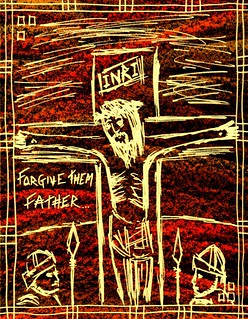1 Peter 3:18 For Christ died once for all sins of the
righteous and unrighteous, to restore you to God. He was physically executed,
but made alive again through the Spirit.
Today’s chosen verse contains the
common core of our Christian beliefs. Jesus died for our sins because there was
no one else and no other way that this could be accomplished. Without His
crucifixion, there would be no sacrifice. Without His death, there would be no
forgiveness. And without His resurrection, there would be no hope of
everlasting life.
Some people claim that Christ died
accidentally for being in the wrong place, at the wrong time, and confronting
the wrong authorities. They say that He never meant to die, but would have
continued preaching, teaching, and healing well into His old age. They say this
because they can’t cope with the fact that God required His Son to die for us.
They don’t believe it because their pride won’t allow anyone to die for their
sins. It’s almost as if they think that they will be able to advocate for
themselves in the after-life without having Christ as an intermediary.
Sadly, they are both deluded and
wrong. None of us can talk to God face-to-face. We don’t have that right
because we are not equals. We won’t be given that opportunity, no matter how
cosmically unjust we might think that would be. God does not apply Himself or
live by our rules. We, on the other hand, live under His authority and sovereignty.
The rules belong to Him.
Thank goodness, then, that Jesus
actually died for our sins. In Him, we have the perfect Savior of our souls and
the everlasting Advocate before God. Because of what He has done, we can be
forgiven. Because of the blood that He shed, we can be restored. Because of His
sacrifice, we can be hopeful of Life beyond death, Heaven beyond the universe,
and Love beyond all of our imaginings. He died for our sins – to restore us to
God totally, finally, and eternally.
Questions for personal reflection
What does Christ’s
death mean to my faith in Him? How else could my sins be forgiven?
Prayer: Lord Jesus, You are the Source of
our Salvation and the Living One who leads us to eternal life. There is no one
else in History, on Earth, or under Heaven who could give us this Blessing of
all blessings. We thank You for Your sacrifice and we praise You for Your
victory over sin and death. In Your Holy Name, we cheerfully and gratefully
pray. Amen.
John
Stuart is the pastor of Erin Presbyterian Church in Knoxville, Tennessee. If
you would like to comment or ask questions about today’s message, please send
him an email to traqair@aol.com.
Today’s
image is part of a Holy Week series of images that John created for 2014. If
you would like to view a larger version, please click on the following link: https://farm8.staticflickr.com/7194/13939576594_9f95bfb516_b.jpg
